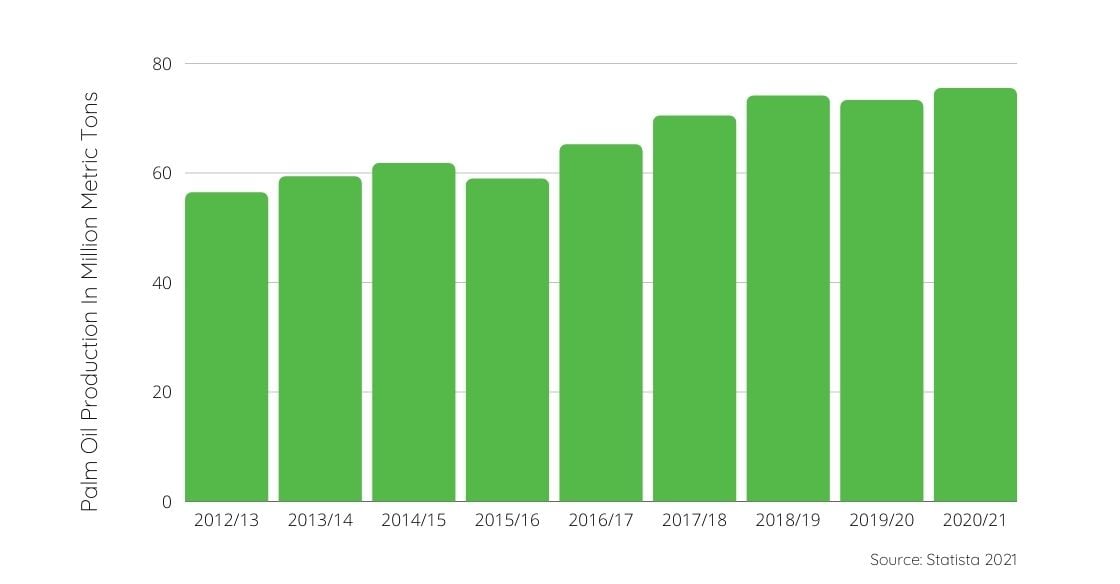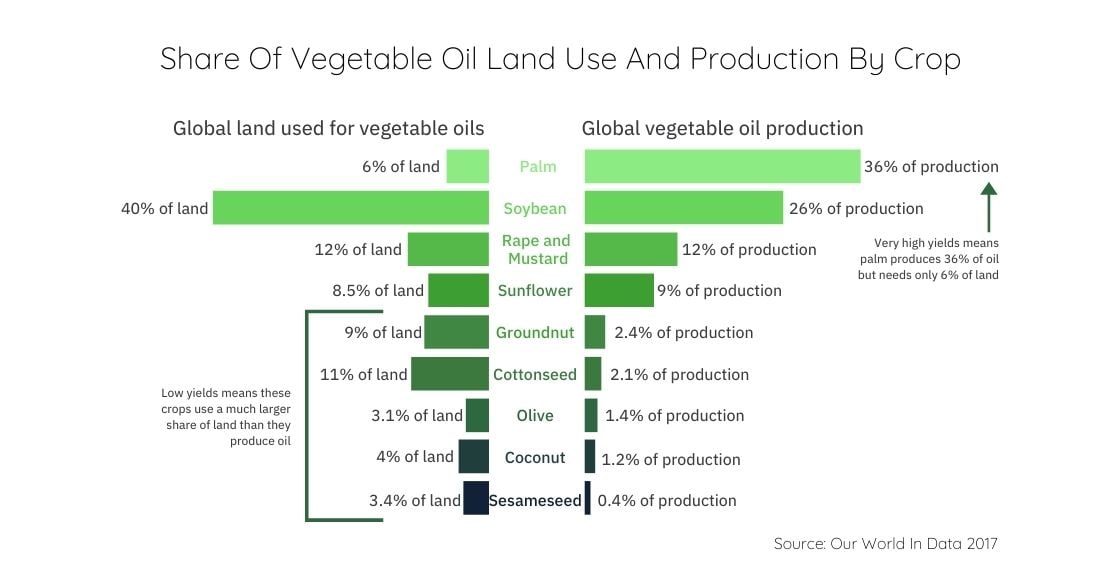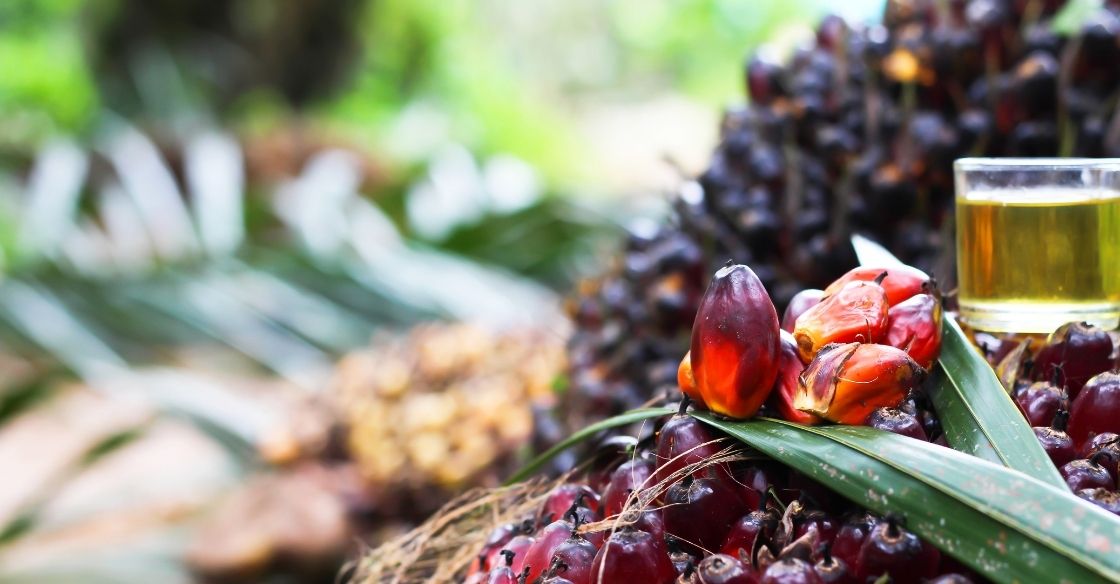Guide To Sustainable Palm Oil In Your Supply Chain
For the last half-century, demand for palm oil has steadily increased. Today, production reaches over 75 million metric tons, of which Indonesia and Malaysia are the main purveyors.

Palm oil has risen to fame as a somewhat healthier vegetable oil, or as a safe alternative for people with allergies to nut oils. But its versatility is what makes palm oil the material of choice for food products and beyond; it is found in many brands of cosmetics, cleaning products, detergents, and even biofuel.
The continuous increase in palm oil output has unfortunately come at a high social and environmental cost, which has gained more publicity and awareness with consumers in the past few years.
Palm oil has been tainted with alarming reports revealing its impact on the environment and people raising the question of sustainability and accountability in the supply chain, which can be a challenge given supply chain complexity.
In this article, we outline the risks associated with sourcing palm oil and the measures you can take as a supply chain professional to minimize its adverse impact and promote sustainable practices for your brand.
Global Concerns Linked To Intensive Palm Tree Farming
In view of the negative press palm oil has received over the years, many brands have taken the “palm free” route. While commendable, this can greatly hurt the palm oil farmers that are practicing sustainable methods and following the right best practices. Additionally, even if there are alternatives for food products, that is not necessarily the case for household products or cosmetics. As of today, safer and/or more sustainable substitutions may not exist.
If farmed correctly, palm oil does have environmental advantages compared to other types of vegetable oils. As Our World in Data points out, sustainable palm oil achieves much bigger yields than any other vegetable oil crop. In fact, palm oil production satisfies 36% of production using only 6% of the land requirements of other crops.

The answer to palm oil sourcing issues is not necessarily to stop using palm oil, but instead to make sure you’re sourcing from the right suppliers. - Click To Tweet
Sourcing from the wrong suppliers can lead to many ethical and environmental issues, most commonly deforestation and human rights abuses.
Deforestation
To satisfy demand, growers have been under pressure to increase production. As a result, deforestation has occurred on a massive scale with the common practice of slashing and burning rainforests. With timber being another valuable resource, logging companies work hand in hand with palm oil companies, clearing vast areas of exotic timber to make room for plantations. Long-term consequences include:
- Loss of biodiversity
- Threat to endemic species
- Loss of food source for those species
- Animal/human conflict
- Diminution of the surface available to absorb CO2
- Release of a CO2 bomb in the atmosphere by burning forests
- Air pollution posing a risk to human health
Human Rights Abuses
Intensive palm farming is also linked to human rights violations in many forms. These sadly include:
- Native communities deprived of their land
- Exploited mill workers
- Child labor on plantations
Solutions Toward Sustainable Palm Oil In Your Supply Chain
In the absence of government regulations currently, there is a need for voluntary commitment from brands to trace their supply chains to ensure sustainable palm oil sourcing.
To help organizations navigate the complexity of the palm oil supply chain and ensure responsible sourcing, the Roundtable on Sustainable Palm Oil (RSPO) offers certification programs across various stakeholders: growers, processors, manufacturers, retailers.
Created in 2004, RSPO has developed sets of global standards qualifying farming and processing practices as sound and sustainable, granting the use of a “certified palm oil” label.
Among other criteria, the RSPO certification assesses the environmental impact, primary forest preservation, high-value areas of biodiversity, and land clearance methods.
The RSPO system proposes different levels of supply chain models, accommodating business constraints and processes, though their goal is to make sustainable palm oil the standard for every business.
Identity Preserved (IP)
Certified oil palm products traceable to a single mill and supply source.
Segregated (SG)
Oil palm products are fully RSPO certified but come from different certified sources, so are untraceable to the plantation.
Mass Balance (MB)
Mixed certified and uncertified palm oil, granting companies the right to claim sustainable and certified products.
Book And Claim (BC)
System by which manufacturers and retailers can buy credits from growers, crushers, and independent smallholders without any monitoring process for sustainability in the supply chain.
Bringing Sustainability Into Your Supply Chain
Consumers are becoming more and more educated on the issues of palm oil and the negative impacts of unscrupulous cultivation. The threats to human welfare, biodiversity, and the environment affect everyone. No one wants to be responsible for the extinction of vulnerable species, nor support modern-day slavery.
It is supply chain leaders’ responsibility to ensure their products are the result of ethical and sustainable practices.
There are over 400 names by which palm oil or its derived products can be labeled, so identifying their presence in your supply chain is essential.
The next critical step is to work closely with your suppliers. Coach and educate them so they understand the importance and long-term benefits of committing to sustainable processes. Encourage them to obtain the RSPO certification and build trust from the source itself.
Source Intelligence’s palm oil solution ensures you are sourcing from the right suppliers. We understand the complexity of supply chains and the relationships within. In that regard, we’ve developed a program that simplifies data collection and aggregation so you can source Certified Sustainable Palm Oil (CSPO) with confidence.
To further enrich your knowledge of what’s at stake in the oil palm industry and grasp the risks your brand may be exposed to, we encourage you to download our white paper: The State of Sustainable Palm Oil Sourcing ~ Current Issues and Certification Standards. In this white paper, you’ll learn:
- The palm oil and the palm oil market
- The biggest problems in the palm oil industry
- Current issues with sustainability
- The different actions taken to drive sustainability
Download our white paper to learn more about sustainable palm oil or request a demo to see what our Palm Oil solutions can do for you.



